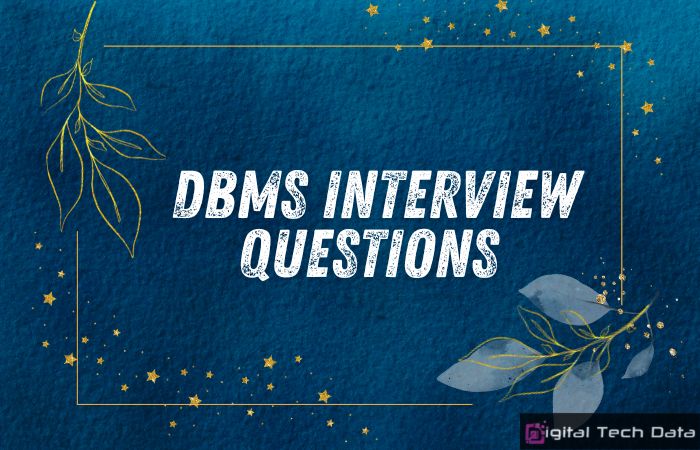Top DBMS Interview Q & A for Freshers and Experienced Professionals

If you’re preparing for a database-related job role, DBMS interview questions are almost guaranteed to come up. DBMS (Database Management System) is the backbone of data storage, retrieval, and management in modern applications. Employers use these questions to assess your technical expertise, problem-solving skills, and understanding of database concepts.
In this article, we’ll cover the most commonly asked DBMS interview questions, from basic concepts to advanced topics, along with clear answers and tips to help you ace your next interview.
Why Are DBMS Interview Questions Important?
Database Management Systems are used in almost every domain — from banking systems to e-commerce platforms. Understanding DBMS fundamentals helps you:
- Efficiently organize and manage large datasets
- Write optimized queries
- Ensure data integrity and security
- Design scalable systems
Basic DBMS Interview Questions
1. What is DBMS?
Answer:
A DBMS (Database Management System) is software that manages and organizes data in a structured way. It allows users to store, retrieve, and manipulate data efficiently while ensuring data security and integrity. Examples: MySQL, Oracle, PostgreSQL, and MongoDB.
2. What are the types of DBMS?
Answer:
- Hierarchical DBMS: Data is organized in a tree-like structure.
- Network DBMS: Data is represented as records connected by links.
- Relational DBMS (RDBMS): Data is stored in tables with rows and columns.
- Object-Oriented DBMS: Data is stored in objects, as in object-oriented programming.
3. What is the difference between DBMS and RDBMS?
Answer:
- DBMS: General term for database management systems; may or may not use tables.
- RDBMS: A DBMS that stores data in tables and supports relationships between them (e.g., MySQL, PostgreSQL).
4. What is a primary key?
Answer:
A primary key is a column (or combination of columns) that uniquely identifies each row in a table. It cannot be NULL and must have unique values.
5. What is a foreign key?
Answer:
A foreign key is a column that links two tables together, referencing the primary key in another table to maintain referential integrity.
Intermediate DBMS Interview Questions
6. What is normalization?
Answer:
Normalization is the process of organizing data in a database to reduce redundancy and improve data integrity. Common normal forms:
- 1NF (First Normal Form)
- 2NF (Second Normal Form)
- 3NF (Third Normal Form)
- BCNF (Boyce-Codd Normal Form)
7. What is denormalization?
Answer:
Denormalization is the process of combining tables or adding redundant data to improve query performance, often used in data warehousing.
8. Explain ACID properties.
Answer:
- Atomicity: All operations in a transaction are completed or none are.
- Consistency: Database remains in a valid state before and after the transaction.
- Isolation: Transactions are executed independently of one another.
- Durability: Changes made by a transaction are permanent after commit.
9. What is indexing in DBMS?
Answer:
An index is a data structure that improves the speed of data retrieval from a database table at the cost of extra storage space and slower write operations.
10. What is a view in DBMS?
Answer:
A view is a virtual table created from a SQL query. It displays data from one or more tables without storing it physically.
Advanced DBMS Interview Questions
11. What is concurrency control in DBMS?
Answer:
Concurrency control ensures that multiple transactions can occur simultaneously without causing data inconsistency. Techniques include locking, timestamp ordering, and optimistic concurrency control.
12. Explain deadlock in DBMS.
Answer:
A deadlock occurs when two or more transactions block each other by holding resources the other needs, creating an infinite wait cycle.
13. What is the difference between DELETE, TRUNCATE, and DROP?
Answer:
- DELETE: Removes rows from a table; can use WHERE
- TRUNCATE: Removes all rows without logging each deletion; faster than DELETE.
- DROP: Removes the table structure and data permanently.
14. What is a stored procedure?
Answer:
A stored procedure is a precompiled collection of SQL statements stored in the database that can be executed repeatedly.
15. What are triggers in DBMS?
Answer:
A trigger is a set of SQL statements that automatically execute in response to certain events on a table, such as INSERT, UPDATE, or DELETE.
Tips to Ace DBMS Interviews
- Practice SQL Queries: Write and test queries regularly.
- Understand Theory + Application: Don’t just memorize definitions — know how to apply them.
- Review ER Diagrams: Be prepared to design or interpret them.
- Know Real-World Use Cases: Give examples of DBMS usage in projects you’ve worked on.
Conclusion
DBMS interview questions test not only your theoretical understanding but also your ability to design, optimize, and troubleshoot databases. By preparing the basics, intermediate concepts, and real-world applications, you can walk into your interview with confidence.
Related Articles:
MySQL Interview Questions: The Ultimate Guide to Crack Your Next Job Interview
